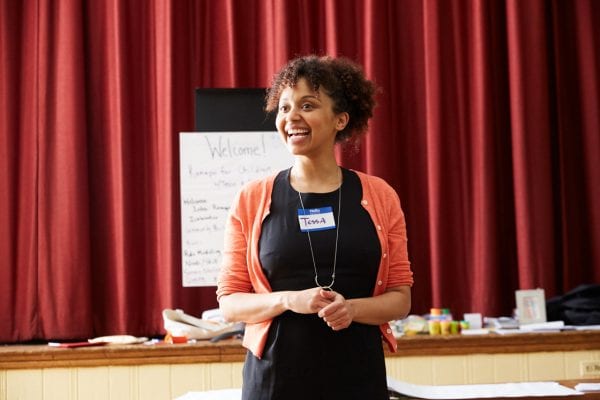Here is an article from The New Paltz Oracle about the training session:
Many staff and some professional and academic faculty participated in an excellent Ramapo workshop on building inclusive classrooms last fall. The interactive session highlighted the many different ways we and our students experience the classroom and the learning experience.
Alika Hope is our trainer/facilitator. She holds a graduate degree in Special Education from Teacher’s College at Columbia University, has been a full-time college faculty member and is the founder of the ‘Ray of Hope Project.”
Thanks to generous support from the Kressner Family ASD Program Fund, the campus is pleased to host the prestigious Ramapo in-service training program. The three-hour workshop will provide those who support and interact with students on the front lines (in and outside the classroom) with a ‘toolbox’ of needed skills to enhance everyone’s experience. In our interactions with students, the changing landscape demands a need to hone our basic skills in order to enrich our interactions with students whose behavior may create challenges for them in their transition to New Paltz and their careers after college.
Please RSVP by January 18th
DOODLE LINK can be reached by clicking here: https://doodle.com/poll/92pwgdki4mk5shhb
“Building Your Toolbox:
A comprehensive skill set for supporting students on the Autism spectrum and others with behavioral challenges”
- Gain the skills necessary for enhancing your interactions with students
- Help students succeed at New Paltz and beyond
- Add this professional development experience to your C.V.
- Receive your own copy of a Workbook for implementing what you learn in the workshop
Citing content from the attached training outline, the well-respected consulting group from NYC (“Ramapo”) has as their slogan, “Building Relationships, Inspiring Success.” They work towards “supporting the success of young adults” …. “by promoting positive behavioral change, fostering social and emotional skill development, and helping to support learning and personal growth.” “At the heart of the Ramapo approach is our ability to equip educators…” and in turn, to have educators help students align their behaviors and skills with their aspirations.
Six (6) key content areas will be reviewed, especially Role Modeling, Building Relationships and Clarifying Expectations (see below for further details).
Background & Further Details:
With 90 years of experience in direct service and training programs, Ramapo for Children has developed a unique ability to create inclusive environments that promote positive behavioral change, foster social and emotional skill development, and help support learning and personal growth. At the heart of the Ramapo approach is our ability to equip educators, caregivers and youth with the skills they need to build trusting relationships, serve as effective role models, handle challenging behaviors constructively, and improve continuously through reflective practice.
Ramapo’s model is grounded in the belief that the social and emotional challenges young adults exhibit reflect some combination of unmet needs and lagging skills. Ramapo supports young people whose behaviors put them at risk of being marginalized or alienated from their schools and communities; by helping adults see challenging young adults through a new lens, and by giving them a toolbox of skills and techniques for helping young adults align their behaviors with their aspirations.
Content of the Ramapo Approach:
Central to the Ramapo Approach is the focus on both educators’ attitudes and behaviors. Ramapo’s work is designed to help educators move towards a model that focuses on meeting student needs and teaching students skills. This professional development model supports shifts in practices by providing specific tools and strategies for identifying, promoting and teaching school and work place norms and expectations. These tools and strategies are organized into six content areas: role modeling; building relationships; clarifying expectations; establishing structures and routines; adapting for individual needs; and responding, reflecting and repairing. The first four content areas are organized around strategies relevant for all young adults that focus on creating environments that support success, the fifth content area focuses on students who have been identified as needing additional support, while the last content area focuses on the response once expectations have not been met.
- Content Area 1 – Role Modeling: this area is based on the principle that observational learning and role modeling are powerful teaching tools. The six strategies in this content area are focused on cultivating intentionality in adult behavior.
- Content Area 2 – Building Relationships: this area is based on the assumption that personal relationships are essential to motivating behavioral change and the skill of building relationships can be learned. The seven strategies include “Identify and celebrate individual strengths” and “Reinforce positive behavior.”
- Content Area 3 – Clarifying Expectations: this area is based in the belief that adults need to clarify behaviors that support community goals and values. The seven strategies in this content area begin with, “Identify and promote community expectations.”
- Content Area 4 – Establishing Structures and Routines: The Ramapo Approach believes that young people thrive in organized environments where routines teach, reinforce, and celebrate desired behaviors. Strategies outlined in this area focus on creation of schedules and “Organize space, time, people and materials.”
- Content Area 5 – Adapting for Individual Needs: this area is designed to meet the needs of young people who struggle to meet community expectations. There are nine strategies that help target individual students who need additional support and targeted planning.
- Content Area 6 – Responding, Reflecting, Repairing: this area gives adults the tools they need in order deal effectively with conflict, crisis and behaviors that violate community expectations. The nine strategies in this content area are based on the Ramapo Approach’s belief that “Supportive communities commit to responding to challenges, reflecting on experiences, and repairing relationships.”






